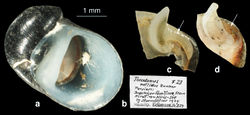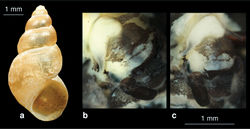Difference between revisions of "Theodoxus fluviatilis"
m (Imported from ZooKeys) |
m (1 revision) |
(No difference)
| |
Latest revision as of 08:03, 4 September 2012
| Notice: | This page is derived from the original publication listed below, whose author(s) should always be credited. Further contributors may edit and improve the content of this page and, consequently, need to be credited as well (see page history). Any assessment of factual correctness requires a careful review of the original article as well as of subsequent contributions.
If you are uncertain whether your planned contribution is correct or not, we suggest that you use the associated discussion page instead of editing the page directly. This page should be cited as follows (rationale):
Citation formats to copy and paste
BibTeX: @article{Glöer2012ZooKeys219, RIS/ Endnote: TY - JOUR Wikipedia/ Citizendium: <ref name="Glöer2012ZooKeys219">{{Citation See also the citation download page at the journal. |
Ordo: Neritoida
Familia: Neritidae
Genus: Theodoxus
Name
Theodoxus fluviatilis (Linnaeus, 1758) – Wikispecies link – Pensoft Profile
- Theodoxus doriae Issel, 1865 (synonymy)
Records from Iran
(all mentioned as Theodoxus doriae Issel): Kerman (Issel 1863[1], Martens 1874[2], Biggs 1937[3]); Gilan, Mazandaran and Lorestan Province (Mansoorian 2000[4]).
New records
Fars Province: IR13-07 [3 ex.]; IR14-07 [2 ex.]; Khorrasan Province: IR76-05 [1 ex]; IR 64-05 [1 ex.]; IR78a-05 [2 ex.]; IR79-05 [1 ex.]; Hormozgan Province: IR 17-11 [5 ex.]
Associated species
Melanopsis sp., Radix sp., Planorbis intermixtus, Farsithyra farsensis, Physella acuta.
Remarks
Martens (1879)[5] synonymised Theodoxus doriae, the species reported by Issel (1863)[1] from S Iran, with Theodoxus fluviatilis. Later on, Mansoorian (2000)[4] described the operculum of Theodoxus doriae, which has only a rib, no peg. However, the shell illustrated by Mansoorian (1994)[6] agrees well with Theodoxus fluviatilis. Thus we follow Martens’ (1879)[5] synonymisation of Theodoxus doriae with Theodoxus fluviatilis. Our samples revealed onlythe presence of Theodoxus fluviatilis.
Distribution
W- to Central-Palaearctic. Theodoxus fluviatilis has been considered by many authors to be an exclusively European species (see e.g. Zhadin 1952[7], Glöer 2002[8]). But Bourguignat (1864)[9], Brown (1994)[10] and Van Damme (1984)[11] mentioned it from NW Africa (Morocco, Algeria). Records of this species in Turkey (Yıldırım 1994), and in Iran, confirm its wide distribution. However, it does not occur in Siberia (Vinarski, pers. comm.).
Taxon Treatment
- Glöer, P; Pešić, V; 2012: The freshwater snails (Gastropoda) of Iran, with descriptions of two new genera and eight new species ZooKeys, 219: 11-61. doi
Other References
- ↑ 1.0 1.1 Issel A (1865) Catalogo dei Molluschi raccolti dalla Missione Italiana in Persia, aggiuntavi la descrizione delle specie nuove o poco note. Memorie della Reale Accademia delle Scienze di Torino, (Ser. II) 23 [1866]: 387–439, 3 tavv. Torino. [Separatum: pp. 1–55, 3 tavv. Stamperia Reale, Torino 1865.]
- ↑ Martens E (1874) Ueber vorderasiatische Conchylien nach den Sammlungen des Prof. Hausknecht. Novitates conchologicae. Supplement V.: 63–82 (Gastropoda).
- ↑ Biggs H (1937) Mollusca of the Iranian Plateau. Journal of Conchology 20: 342-350.
- ↑ 4.0 4.1 Mansoorian A (2000) Some freshwater snails from Northern Iran. Iranian Journal Public Health 29(1–4): 77-82.
- ↑ 5.0 5.1 Martens E (1879) Die Gattung Neritina. Systematisches Conchylien Cabinet, II. 10, 303 pp.
- ↑ Mansoorian A (1994) Freshwater snails of Iran. Scientific publication of School of Public Health & Institute of Public Health Research, Technical series 2145: 1374.
- ↑ Zhadin V (1952) Mollusks of Fresh and Brackish Waters of the U.S.S.R. Academie of Sciences of the Union of Soviet Socialist Republics (translated by the Israel Program of Scientific Translations, Jerusalem 1965), xvi + 368 pp.
- ↑ Glöer P (2002) Die Süßwassergastropoden Nord- und Mitteleuropas. Bestimmungsschlüssel, Lebensweise, Verbreitung. Die Tierwelt Deutschlands, 73, 327 pp.
- ↑ Bourguignat J (1864) Malacologie de l’Algérie. Histoire naturelle des animaux mollusques terrestres et fluviatiles. Vol. II. Chalamelle Ainé, Paris, 380 pp.
- ↑ Brown D (1994) Freshwater Snails of Africa and their Medical Importance. 2nd ed. Taylor & Francis, London, 608 pp.
- ↑ van Damme D (1984) The Freshwater Mollusca of Northern Africa. Dr. W. Junk Publishers, Dordrecht, 164 pp.
Images
|

